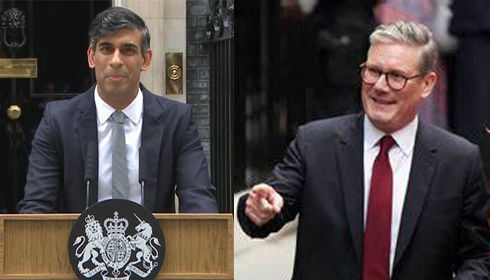
UK Elections 2024: New Government faces uphill task of reforming NHS
The new Labour government, which has won a landslide victory in the recently concluded general elections, has to take daring initiatives to revamp the healthcare system in the UK, tackling substantial challenges left behind by the previous Conservative government. In light of the NHS's unprecedented challenges, the Labour Party has pledged comprehensive reforms with the goal of diminishing waiting times, enhancing healthcare provision, and promoting overall public health.
Labour's healthcare reform agenda prioritises the swift reduction of the large waiting list backlog. The government has committed to providing an extra two million treatments, scans, and appointments within the initial year. The Party had promised during the election that if elected, its government would achieve this by increasing remuneration for overtime work among NHS personnel and enhancing weekend accessibility.
Sir Keir Starmer, the leader of the Labour Party, and the new Prime Minister have made a commitment to meet the NHS's goal of ensuring that patients wait no longer than 18 weeks for treatment by the conclusion of their initial term in 2029. Sir Keir Starmer will achieve this by adding around 40,000 extra appointments every week.
In another significant matter, Wes Streeting, the then opposition health secretary, presented plans to alleviate system bottlenecks by procuring several beds from nursing homes and increasing the use of private hospitals for publicly funded surgery. The objective of this project is to enhance the movement of patients and reduce the burden on NHS facilities.
Labour plans to evaluate the effectiveness of "neighbourhood health centres," which aim to combine services provided by doctors, nurses, care workers, and mental health specialists, with the goal of transforming primary care. This technique aims to regulate the flow of patients into A&E hospitals by providing comprehensive care in community settings. The Labour Party's manifesto proposes the establishment of "shared waiting lists" among nearby hospitals to expedite patient care and efficiently handle waiting lists by leveraging the capacity of private hospitals.
Labour intends to enhance the position of family doctors by increasing GP remuneration, guaranteeing people's access to their preferred practitioner, and removing the chaotic rush for appointments in the morning by improving the use of the NHS app. The upcoming app improvements will enable users to participate in clinical trials, evaluate the performance of local hospitals, and receive health check notifications. This will modernise a system that has previously relied on outdated technologies like pagers and fax machines.
The recent healthcare reform efforts by the current government follow a series of challenges faced by the previous Conservative administration, encompassing political, financial, and public health concerns. The recording of waiting lists, health worker strikes, and widespread unhappiness among patients and staff underscore the perilous state of the NHS. Despite numerous pledges, there have been limitations on budget expansions, as Labour's plan sharply differs from the Conservative approach.
Labour has pledged to prioritise reforming the NHS in order to restore its position as a leader in healthcare, rather than solely focusing on financial spending. This approach involves the provision of education to a large number of new medical professionals, including doctors, nurses, and midwives. It also entails implementing professional mental health services in every school, as well as adding 700,000 dentist appointments with supervised toothbrushing for young children.
The Lancet editorial analyses the wider framework of Labour's victory, highlighting the substantial losses suffered by the Conservative Party following their 14-year tenure in power. The United Kingdom has witnessed a decline in health outcomes, an increase in inequality, and a pressing need for robust measures to counteract these patterns. Public health data indicates a decrease in life expectancy and a rise in childhood mortality, underscoring the necessity of Labour's healthcare strategy.
Labour aims to mitigate the 10-year gap in life expectancy between the wealthiest and poorest counties in England by addressing the social factors that influence health. However, specific details regarding dates and costs are currently unavailable. Their policy aims to mitigate health inequalities caused by austerity measures and the COVID-19 pandemic, which revealed deficiencies in the UK healthcare system.
The Labour government now faces the crucial responsibility of upholding its promises, reinstating a robust and reliable healthcare system, and enhancing public health in alignment with its ambitious objectives. The successful execution of these reforms is crucial for the future of healthcare in the UK, requiring a thorough understanding of health goals and a strong dedication to substantial policy and funding expenditures.